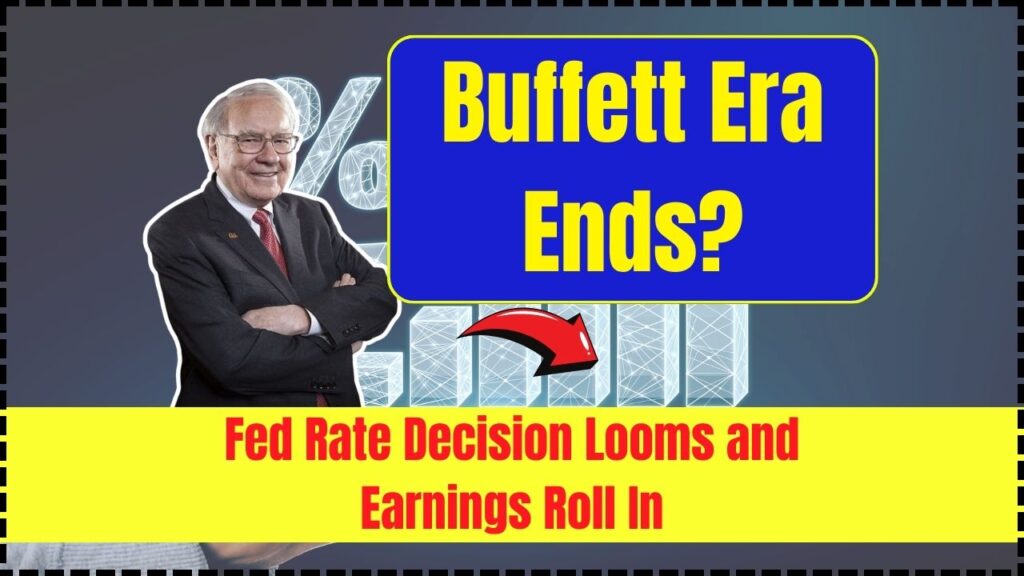Buffett Era Ends? This week could very well go down in Wall Street history. Three major events are converging to shape the investment landscape: Warren Buffett’s official retirement announcement, an upcoming Federal Reserve interest rate decision, and a crucial week of corporate earnings reports. Whether you’re a seasoned investor or someone just starting to understand the markets, these developments offer valuable lessons—and opportunities.
Warren Buffett stepping down after six decades marks not just a shift in leadership at Berkshire Hathaway, but a symbolic transition in the era of value investing. Meanwhile, the Federal Reserve’s decision on interest rates may indicate where inflation and economic growth are headed next. Add in a packed earnings calendar from key sectors, and it’s easy to see why this is a critical week for market watchers.
Buffett Era Ends?
This week is a perfect storm of market-moving events. From Warren Buffett’s historic retirement announcement to the Federal Reserve’s much-anticipated rate decision and a cascade of earnings reports, the investment landscape is undergoing a major shift. Whether you’re a beginner or a professional trader, now is the time to pay close attention, reassess your strategy, and prepare for the road ahead.

| Topic | Details |
|---|---|
| Warren Buffett Retirement | Buffett, 94, announced he will retire as CEO of Berkshire Hathaway by end of 2025. Greg Abel will succeed him. |
| Berkshire Hathaway Value | Company transformed under Buffett from textile firm to $1.2 trillion conglomerate. BRK.A stock hit $809,350. |
| Federal Reserve Rate Decision | Next FOMC meeting is on May 7, 2025. Current fed funds rate is 4.25%–4.50%. |
| Earnings Calendar | Big names this week: Tyson Foods (May 5), Palantir (May 6), Disney & Uber (May 7), Airbnb & PayPal (May 8), DraftKings (May 9). |
| Investment Implications | Market likely to experience volatility based on Fed decisions, leadership changes, and earnings outlook. |
| Official Resources | Berkshire Hathaway Website |
Warren Buffett’s Retirement: Buffett Era Ends?
Warren Buffett, known globally as the “Oracle of Omaha,” has been the guiding light of value investing since he took over Berkshire Hathaway in 1965. Back then, it was a struggling textile mill. Under Buffett’s stewardship, it evolved into a $1.2 trillion behemoth with stakes in Coca-Cola, Apple, American Express, and numerous insurance and utility companies.
Buffett’s official announcement that he will step down as CEO at the end of 2025 wasn’t entirely unexpected—he’s 94, after all—but the news still marks the close of a remarkable chapter in corporate America.
Who is Greg Abel?
Greg Abel, 62, will succeed Buffett as CEO. He currently oversees Berkshire’s non-insurance businesses and has been praised for his operational acumen and steady leadership. Abel, a Canadian native and former CEO of Berkshire Hathaway Energy, was first identified as Buffett’s successor in 2021. Abel has already been handling day-to-day operations for several years, giving investors confidence in the continuity of the company’s investment philosophy.
What Investors Should Do
- Re-evaluate Berkshire Holdings: Long-term holders should assess if they believe in Abel’s leadership and the company’s diversified structure.
- Watch for Strategy Shifts: While no drastic changes are expected, Abel may modernize Berkshire’s approach to technology and ESG investing.
- Monitor Shareholder Sentiment: Watch BRK.A and BRK.B volumes and price action for market sentiment clues.
Federal Reserve Interest Rate Decision: A Potential Turning Point
The Federal Open Market Committee (FOMC) is meeting on Wednesday, May 7, 2025, and the financial world will be hanging on every word from Chair Jerome Powell. The fed funds rate currently stands at 4.25% to 4.50%, after a series of hikes intended to combat persistent inflation.
What’s at Stake?
- Inflation vs. Recession: The Fed walks a tightrope between curbing inflation and avoiding a recession.
- Soft Landing Goal: The ideal scenario is a “soft landing” where inflation slows without triggering massive unemployment or economic contraction.
Analyst Consensus
Most analysts believe the Fed will pause rate hikes this month. However, signals about future easing or tightening will be critical. A dovish tone could boost equity markets, while any hawkish surprise might rattle stocks and bonds.
Advice for Investors:
- Review fixed-income exposure—bond prices move inversely to rates.
- Expect short-term volatility in sectors sensitive to interest rates, such as real estate, banking, and technology.
Corporate Earnings: A Window into the Economy
While Buffett’s retirement and the Fed decision dominate headlines, investors cannot overlook the powerful wave of earnings reports coming this week. These will serve as real-time indicators of consumer demand, corporate health, and economic momentum.
Key Reports to Watch
May 5 – Tyson Foods (TSN)
Expect insight into food inflation, meat production, and cost pressures from logistics and labor.
May 6 – Palantir Technologies (PLTR)
A key stock in the AI and data analytics space, Palantir’s earnings will show whether commercial growth is catching up with its strong government contracts.
May 7 – Walt Disney (DIS), Uber (UBER)
- Disney: Watch streaming numbers (Disney+), park revenue, and ad spend trends.
- Uber: Mobility trends, delivery business margins, and international expansion will be key.
May 8 – Airbnb (ABNB), PayPal (PYPL)
- Airbnb: A bellwether for global travel and tourism recovery.
- PayPal: Digital payments and consumer spending habits in a tightening economy.
May 9 – DraftKings (DKNG)
Provides insight into consumer discretionary spending and the booming U.S. sports betting industry.
Investor Tip: Compare actual earnings with Wall Street expectations (EPS, revenue) and pay close attention to forward guidance and management commentary.
Historical Context: Why These Events Matter
This week is unique not just because of the convergence of news, but because each story reflects broader market trends:
- Succession Planning: Buffett’s retirement reflects the generational shift underway in corporate leadership. Similar transitions are occurring across sectors.
- Monetary Policy as Market Catalyst: The Fed’s influence on asset prices is arguably stronger than at any point since the 2008 crisis.
- Earnings as Real-World Indicators: While economists debate GDP forecasts, earnings reflect what’s happening on the ground—where people are spending and companies are hiring.
Indian Stock Market Falling: Sensex and Nifty Highlights for Investors!
World’s Top 10 Billionaires – How Much Did Their Net Worth Drop?
10 Proven Wealth-Building Strategies the Middle Class Should Start Using Today
Frequently Asked Questions (FAQs)
Q1: Why is Warren Buffett retiring now?
He is 94 years old and has been gradually transitioning leadership. The timing aligns with clear succession plans and a strong company position.
Q2: Who will lead Berkshire Hathaway after Buffett?
Greg Abel will become CEO. He’s currently the Vice Chairman overseeing non-insurance operations.
Q3: What does the Fed interest rate mean for me?
Interest rates affect everything from mortgage costs to savings account returns. A pause could stabilize borrowing costs.
Q4: Should I buy Berkshire Hathaway stock?
This depends on your investment strategy, risk tolerance, and belief in long-term value investing. Always consult with a financial advisor.
Q5: Why are earnings reports important to follow?
They provide real-world data on how companies are performing. This helps investors make informed decisions about which sectors or stocks to buy or avoid.






![Punjab NEET 1st Seat Allotment Result 2024 [OUT]; Download College Allotment](https://lkouniexam.in/wp-content/uploads/2024/08/Punjab-NEET-1st-Seat-Allotment-Result-2024-150x150.webp)

